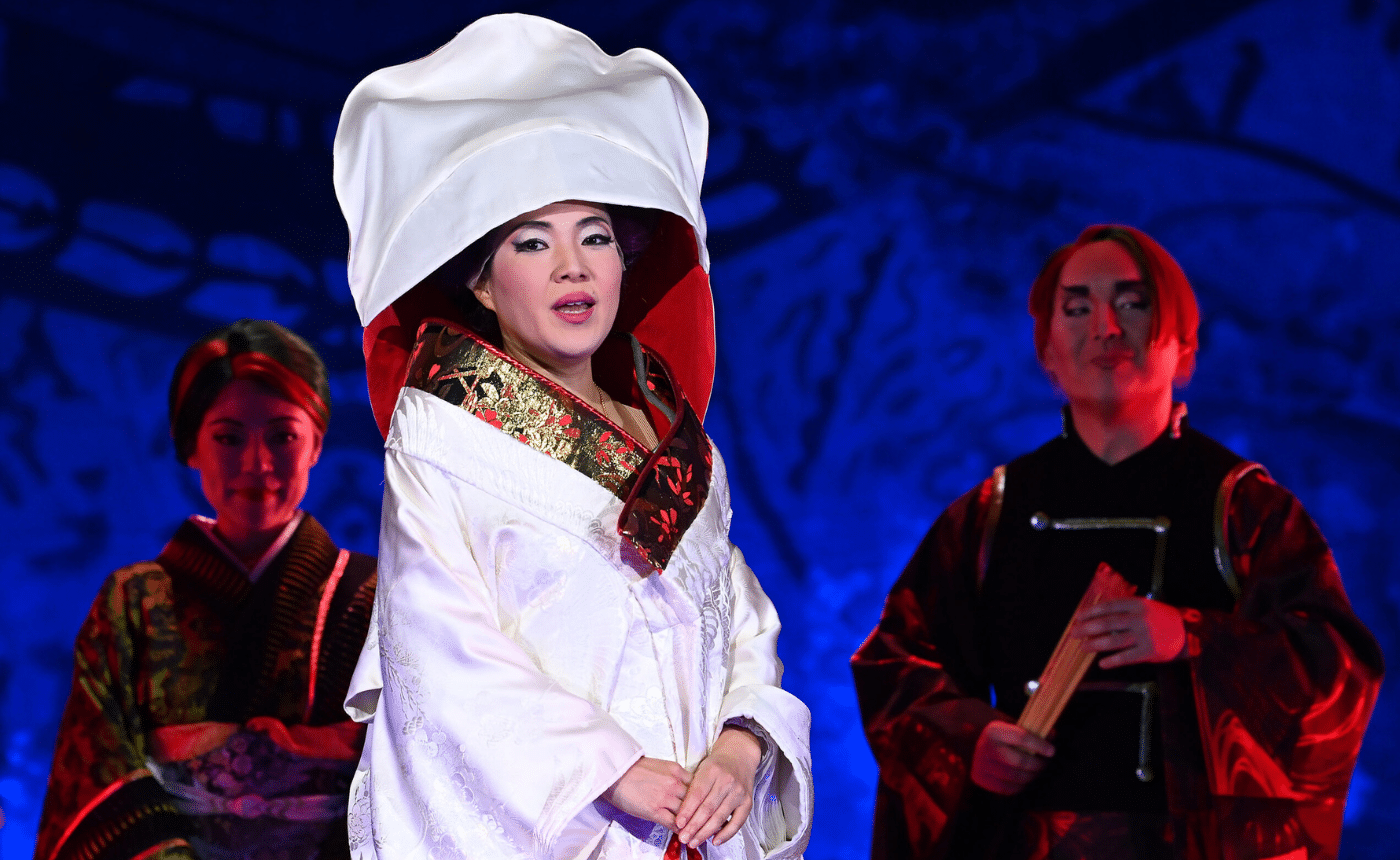Synopsis: “Die Fledermaus” by Johann Strauss, Jr.
Act I: 19th century Vienna, New Year’s Eve
A lovely tenor voice is heard outside the dwelling of wealthy Gabriel von Eisenstein. The serenade is for the mistress of the house, Rosalinda. The family maid, Adele, enters; she is scheming as to how she can convince Rosalinda to give her the night off so that she might attend a ball to which her sister has invited her. Adele pleads that she needs to visit a sick aunt, but her mistress refuses, stating that she requires company because her husband is going off to serve a brief jail sentence, leaving her alone for the evening.
The serenading tenor, Alfred, enters the house full of passion and declares his love for Rosalinda—they had become acquainted while visiting a spa. She hesitates at first but is soon won over by the glory of his voice. She sends him off with a promise that he may return after her husband leaves for jail. Eisenstein and his lawyer, Dr. Blind, arrive fresh from a session in court arguing furiously because Blind has bungled the court hearing, and the prison time has been extended. Rosalinda now, having anticipated a pleasant farewell meal with her husband, throws Blind out. The couple is interrupted by Dr. Falke, a close friend of Eisenstein, who, when Rosalinda goes in search of some old clothes for her husband’s jail stay, takes the opportunity to invite Eisenstein to Prince Orlofsky’s ball, declaring that prison can wait until morning. He insists that Eisenstein bring his very unique watch, which is always certain to fascinate the ladies.
When Eisenstein leaves to change clothes, Dr. Falke persuades Rosalinda that she must attend the ball so that she might observe her husband’s many flirtations. Soon Eisenstein reemerges wearing evening dress and Rosalinda is now convinced of his duplicity. She grants Adele’s request to visit her aunt so that she may be free in the evening to spy on her husband.
Eisenstein and Falke depart, and Alfred immediately arrives. He and Rosalinda anticipate a joyful tête- à- tête but are interrupted by Warden Frank who has come to cart Eisenstein off to jail. In order to preserve the lady’s virtue, Alfred agrees to pose as Eisenstein and to begin serving his sentence.
Act II: Orlofsky’s Villa
The ball is in full swing at the villa of Prince Orlofsky. Discussion centers on the Prince, a melancholy man who often pays for someone to entertain him; tonight, he hopes to be amused by Falke’s promised diversion, “The Bat’s Revenge.” The Eisenstein’s maid, Adele, now wearing one of Rosalinda’s dresses, is shocked to learn that she was not invited to the ball by her sister, Ida, but rather by Falke, who clearly has mischief in mind. In order to render Adele more presentable to such elite company, she is introduced as Olga, a Russian countess. A Frenchman, Monsieur Reynard (actually Eisenstein in disguise) enters and Orlofsky proposes they match one another in alcoholic consumption.
Eisenstein recognizes Adele to be his wife’s maid, but she adroitly brushes him off with references to his own concealed identity.
Others continue to arrive in costume: prison warden Frank poses as an impresario and is immediately taken by Adele, and Rosalinda, wearing a mask, purports to be a Hungarian countess.
Falke, the master puppeteer who is pulling all the strings, introduces her to Monsieur Reynard who proceeds to demonstrate his watch—which she cleverly steals.
Falke, the prankster, now entertains the guests with the story of how he became known as Dr. Fledermaus, or Dr. Bat, when he and his good friend Eisenstein left a party totally inebriated and he, in his bat costume, passed out in a park—a tale that was all over town the next day. The revelry continues as Orlofsky makes a toast to champagne and Eisenstein tries to retrieve his watch from the Hungarian countess to no avail. Finally Eisenstein and Frank realize they’re supposed to be at the jail and rush off.
ACT III: Jail
Singing pours forth from one of the cells to the annoyance of jailer Frosch, who has been tippling in the absence of the warden. Frank arrives, bewitched by the glorious time he experienced at the party and still quite inebriated. Prompted by Falke, Ida and Adele enter and the maid reminds Frank of his promises to put her on the stage; she demonstrates her acting ability by doing some impersonations. The sisters are led to another room when Eisenstein, still playing Monsieur Reynard, enters and learns that someone else has been arrested in his stead. Eisenstein meets his lawyer Blind, recently engaged by Alfred, and quickly they exchange clothes so Eisenstein can confront Alfred. When Rosalinda enters, she, of course, does not recognize her husband and pleads for Alfred’s release and a divorce from her husband. Eisenstein reveals himself and plays the victim until Rosalinda points out that he was himself having a merry old time, and produces the watch as proof. Falke arrives to gloat about his prank, revealing how he set up the evening’s shenanigans. However, Eisenstein reunites with Rosalinda after blaming champagne for his behavior. Orlofsky and his guests enter just in time to grasp the whole story, and the Prince dissolves in laughter at Falke’s thwarted revenge. Orlofsky offers to sponsor Adele’s acting career, and mighty Champagne, the nectar of the gods, is praised by all.



